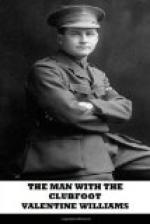Otto von Steinhardt.
On this card was written in pencil, above the name:
“Hotel Sixt, Vos in’t Tuintje,” and in brackets, thus: “(Mme. Anna Schratt.)”
In another pocket of the portfolio was an American passport surmounted by a flaming eagle and sealed with a vast red seal, sending greetings to all and sundry on behalf of Henry Semlin, a United States citizen, travelling to Europe. Details in the body of the document set forth that Henry Semlin was born at Brooklyn on 31st March, 1886, that his hair was Black, nose Aquiline, chin Firm, and that of special marks he had None. The description was good enough to show me that it was undoubtedly the body of Henry Semlin that lay at my feet.
The passport had been issued at Washington three months earlier. The only visa it bore was that of the American Embassy in London, dated two days previously. With it was a British permit, issued to Henry Semlin, Manufacturer, granting him authority to leave the United Kingdom for the purpose of travelling to Rotterdam, further a bill for luncheon served on board the Dutch Royal mail steamer Koningin Regentes on yesterday’s date.
In the long and anguishing weeks that followed on that anxious night in the Hotel of the Vos in’t Tuintje, I have often wondered to what malicious promptings, to what insane impulse, I owed the idea that suddenly germinated in my brain as I sat fingering the dead man’s letter-case in that squalid room. The impulse sprang into my brain like a flash and like a flash I acted on it, though I can hardly believe I meant to pursue it to its logical conclusion until I stood once more outside the door of my room.
The examination of the dead man’s papers had shown me that he was an American business man, who had just come from London, having but recently proceeded to England from the United States.
What puzzled me was why an American manufacturer, seemingly of some substance and decently dressed, should go to a German hotel on the recommendation of a German, from his name, and the style of his visiting card, a man of good family.
Semlin might, of course, have been, like myself, a traveller benighted in Rotterdam, owing his recommendation to the hotel to a German acquaintance in the city. Still, Americans are cautious folk and I found it rather improbable that this American business man should adventure himself into this evil-looking house with a large sum of money on his person—he had several hundred pounds of money in Dutch currency notes in a thick wad in his portfolio.
I knew that the British authorities discouraged, as far as they could, neutrals travelling to and fro between England and Germany in war-time. Possibly Semlin wanted to do business in Germany on his European trip as well as in England. Knowing the attitude of the British authorities, he may well have made his arrangements in Holland for getting into Germany lest the British police should get wind of his purpose and stop him crossing to Rotterdam.




